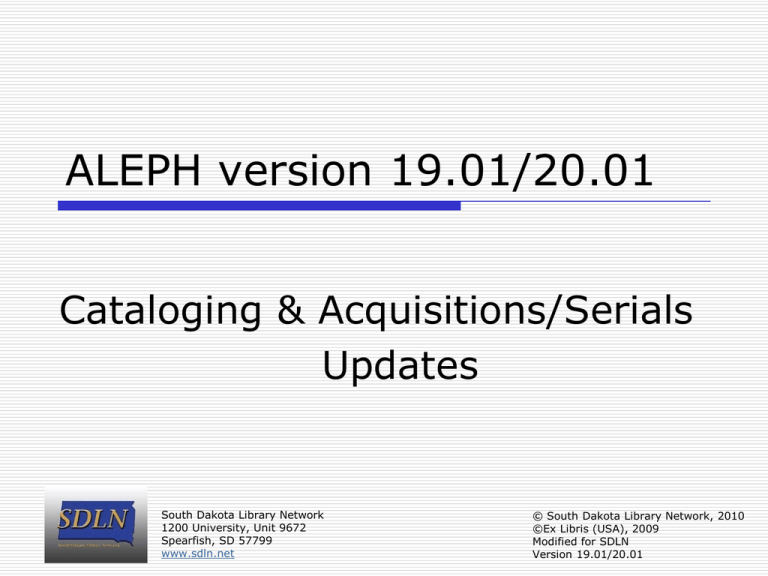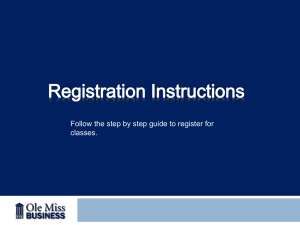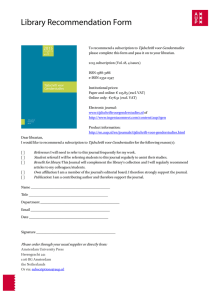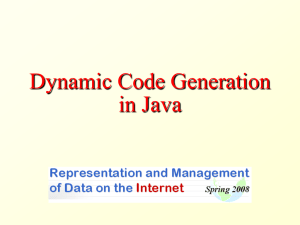ALEPH version 18 - South Dakota Library Network
advertisement

ALEPH version 19.01/20.01 Cataloging & Acquisitions/Serials Updates South Dakota Library Network 1200 University, Unit 9672 Spearfish, SD 57799 www.sdln.net © South Dakota Library Network, 2010 ©Ex Libris (USA), 2009 Modified for SDLN Version 19.01/20.01 Cataloging - Tables changes tab_z30 no longer in use tab_z30 tab_z30 is no longer in use. Its functionality is now handled by the new library tables: tab_loader and tab_loader_def. Both new tables are consulted by the system when the following loaders services are activated: •Advanced Generic Vendor Records Loader (file-90) •Load OCLC Records (file-93) •Load MARCIVE Records (file-99) •OCLC server 2 Cataloging - Table changes tab_loader tab_loader tab_loader is a new ADM library table that defines the desired functionality for loading records into ALEPH. This table defines the policy for creating holding/items/orders/budget transactions. It is used by the following load services: •Advanced Generic Vendor Records Loader (file-90) – New service for ALEPH 19.01 Version •Load OCLC Records (file-93) •Load MARCIVE Records (file-99) •OCLC server 3 Cataloging - Table changes tab_loader_def tab_loader_def tab_loader_def is a new ADM library table that sets the default values for records that are created by the loader services. It defines values for creating items, orders, and budget transactions. It is used by the following load services: •Advanced Generic Vendor Records Loader (file-90) – New service for ALEPH 19.01 Version •Load OCLC Records (file-93) •Load MARCIVE Records (file-99) •OCLC server 4 Cataloging – Vendor Loader Advanced Generic Vendor Records Loader (file-90) The Advanced Generic Vendor Records Loader (file-90) is a new batch service which is accessible via GUI-Cataloging-Services-Load Catalog Records. This service loads MARC bibliographic records, creates associated holding, items, orders, and budget transaction records. This is done using the vendor input file with the ability to merge duplicate bibliographical and holding records and identify records which match multiple existing records. 5 Cataloging – Vendor Loader Advanced Generic Vendor Records Loader (file-90) The Advanced Generic Vendor Loader uses standard loader functionality with the additional functionality as follows: •Full catalog and acquisition handling per bibliographical record; this includes handling bibliographical, holding, item, order, and budget transaction records. •Match and Merge functionality. •Detailed log and report which gives information on records which have been: ◦added (records which were found to be new or were found to have duplicate matches) ◦updated (records which found a single match and were merged) ◦rejected (records which did not have required information in correct format) 6 Cataloging – Vendor Loader Advanced Generic Vendor Records Loader (file-90) The log and report include bibliographical records, added holding records, and added item, order, and budget transaction records. The report includes information of successes and failures and their textual explanations. 7 Cataloging – Vendor Loader Advanced Generic Vendor Records Loader (file-90) The bibliographical record load procedure is implemented as performed in OCLC, RLIN, and MARCIVE, ensuring that standard functionality for load, match, merge, and log file report is part of the process. A log record (Z73) is written for each input record, summarizing the outcome of the record load attempt. A log report is created from the log table showing all operations. The following ADM tables are involved with the records creation procedures: •tab_loader – Determines the desired functionality (create holding/items/orders/budget transactions) for the process. •tab_loader_def – Set the default values for creating items, orders, and budget transactions. •tab_mapping – Configured with the information for the holding records. 8 Cataloging - Edit menu Split into two menus Edit Menu Split Up The Cataloging module’s Edit menu has been split into two menus: •Edit Actions – Listing actions such as Open Form, Browse URL or Check Record •Edit Text – Listing text options, such as New Field, Copy and Paste To open the 'Edit Actions' menu from the record Editor use 'Right-click' mouse option. To open the 'Edit Text' menu from the record Editor use the Shift+ 'Right-click‘ mouse option. 9 Cataloging - Record Deletion New check at record deletion New Check at Record Deletion A new check named check_doc_delete_item_opac may be defined in the check_doc table in order to check whether the record being deleted has associated items that are viewable in the OPAC, i.e. column 10 of their tab15.lng line is set to Y. 10 Cataloging – copy numbers Automatic Setting of Copy Number It is now possible to automatically set item copy numbers in order to distinguish between identical copies of the same title. This may be done by entering a question mark ‘?’ in the Copy Number field of the Item Form and then clicking Update. The system will set a copy number which is an increment of 1 from the last copy number. 11 Cataloging – item changes Notifications and Blocks at Item Change The following options have been added to the process of changing an item’s information: • It is now possible to block changing an item’s item status if the item is on loan. This block is set up by setting the CHANGE-ITM-STS-LOAN tab100 variable to N. • It is now possible to get the following notifications about an item during the item update: o Item is on loan o Item has hold requests o Item has booking requests o Item has photocopy requests o These notifications are relevant only for online single item changes. 12 Serials Subscription List The subscriptions list may also include a ‘Status’ column, showing whether or not the subscription is active based on the subscription’s ‘To Date’. This may be done by adding the following line to pc_tab_col.lng: PC_SERIAL_COPY_L L Status. 09 000 01 C01 subscription 13 Serials Vendor Groups tab A new tab has been added to the Group node of the Serials Tab. The tab, labeled ‘Vendor Groups’, displays one line for all items that share the same enumeration, chronology and vendor. 14 Serials Last checked-in issue A new option has been added to the serial issue check-in (arrival) action. The arrived check in issue might invoke a change in the process status of a previous arrived issue of the same subscription. Setting a different process status for items which were previously checked in enables the library to define a separate circulation policy for these items. 15 Serials Last checked-in issue To implement this change, set PI (Previous Issue Registered) action in col.3 of ./xxx50/tab/tab42. For example: ---1---------2----3-4—-5-SERIAL ##### AR NW SERIAL ##### PI NW In this setup, when the check-in is performed, the system automatically performs the AR (Item arrival registered) and PI (Previous Issue Registered) actions. The first line is read and the item process status of the item that just arrived becomes NW – new (or any other process status defined in Col.4). If the second line is set (see above sample setup), then the item process status of the item that previously arrived is updated to null (or any other process status defined in Col.4). Note that Col.5 is set to ensure that the process status is changed only if the current process status is NW. Use ## in Col.5 to indicate that the current item process status is irrelevant, and that the change is to be made on the previously item that just arrived in all cases. 16 Serials Item Record – subscription default The action of the 'Subscr. defaults' (subscription defaults) button on the item form has changed. When activating the 'Subscr. defaults' button on the Item Form, the Sublibrary and Collection fields of the related subscription record are now driven to the item. This is in addition to all other fields that are already driven from the subscription to the related item: temporary location flag, item status, copy ID, internal note, order number, item statistic, and remote storage. 17 Serials Update of Serial Information within Serials Order Updating various fields in the Vendor Information tab of the Serial Order Record affect the equivalent fields in the order's related subscription record. When a staff user makes a change to one of the following fields at the Serials Order records, the appropriate field in the order's related Subscription Record is automatically updated. The common fields for the order and subscription records are: • Vendor Code • Vendor Reference • Delivery Type • Subscription Start/End Dates The option to have an update between the Serials order and its linked subscription is set in a new tab100 variable: UPD-SUBS-FROM-ORDER. 18 Serials Update of Serial Information within Serials Order Note: Updating the 'Subscription Start Date' field in the Order record to a date later than the current date does not trigger a simple update of the Subscription record. Rather, it triggers creation of a new subscription record, using the Subscription "Create New" functionality. This functionality closes the existing subscription by updating the End Date to the day before the new Start Date and opening a new subscription. 19 Serials Requested Item warning The system may be configured to issue a warning when a change is made in the status of a serial item if the item is requested. The warning will be issued when registering an item’s (or group’s) arrival, un-arrival, or when sending a claim letter for an item. This option is controlled by the new DisplayRequestedMessage acq.ini variable. 20 Serials Order Number Search in Serials Search Bar A new search option has been added to the GUI-ACQ-Serial search bar: Order Number. Activating the 'Order Number' search retrieves subscriptions that are assigned the quoted order number. This new feature enhances the serial work flow and can be used to retrieve multiple subscriptions that are related to one order. 21 Serials New service (serial-17) List of Expected Issues (serial-17) This new service retrieves a list of issues that are expected to arrive in a given time period. The purpose of the list is to enable the user to quickly locate on an item for issue check-in. The list includes the item barcode, which can be entered into the Serials bar to directly access the particular issue. 22 Acquisitions Automatic Creation of Monograph-Type Items Item records can be automatically created by Aleph by taking information from the order record in the Acquisitions module. The material type is now also used when creating the item record. In order to support this, a new column, Col. 2 ‐ Order Material Type, has been added to tab36 of the ADM library. The new column should be populated with order material type code (up to two characters long, as defined in the ACQ_ORDER_MATERIAL menu of the pc_tab_exp_field.lng of the ADM library). The enhanced tab36 table now has two filters (keys), Col.1 ‐ Order Sublibrary and Col.2 ‐ Order Material Type (new column). When the system automatically creates monograph‐type items in Acquisitions, it reads all orders with sublibrary and material types as defined in col. 1 and col.2 and sets the items with the values defined in col.3 and onwards: Col.3 ‐ Item Status, Col. 4 ‐ Item Material Type, Col.5 ‐ Item Collection, Col.6 ‐ Item Call Number and Col.7 ‐ Item Call Number Type. 23






